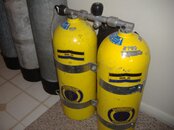and post #6, 1(B) - [emphasis added]:
1. When storing a scuba cylinder for long periods of time, should the tank be stored full or almost empty?
b. Almost empty
Storing a cylinder almost empty helps to reduce corrosion because of the reduced oxygen partial pressure. While this is not so important with an aluminum cylinder, it can make a big difference with a steel cylinder. Also, storing a cylinder almost empty just makes sense from the perspective of reducing permanent expansion although the effects are minimal.
There is too much speculation in the crack propagation concept (so stated in the first post) as there is no idea which alloy was subject to the study. The early "bad" is known to be problematic. The other, not so.
1. When storing a scuba cylinder for long periods of time, should the tank be stored full or almost empty?
b. Almost empty
Storing a cylinder almost empty helps to reduce corrosion because of the reduced oxygen partial pressure. While this is not so important with an aluminum cylinder, it can make a big difference with a steel cylinder. Also, storing a cylinder almost empty just makes sense from the perspective of reducing permanent expansion although the effects are minimal.
There is too much speculation in the crack propagation concept (so stated in the first post) as there is no idea which alloy was subject to the study. The early "bad" is known to be problematic. The other, not so.





